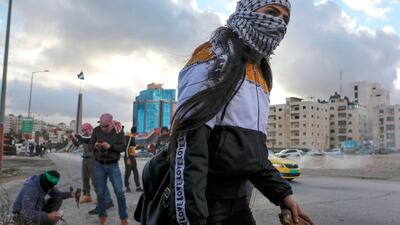Palestinian President Mahmoud Abbas declared on Saturday at an extraordinary meeting of the Arab League in Cairo that he will cut all security ties with both the US and Israel after the release of US President Donald Trump's peace plan.
Mr Abbas has made the threat repeatedly in previous years to display publicly his defiant stance against the Israeli occupation with which his security forces co-operate with every day.
That co-operation was based on the Oslo Accords signed in the 1990s, which have long been regarded as dead agreements.
It remains unclear if the longtime Palestinian leader will follow through on his threat, not only among observers, but also those in his administration, which operates limited self-rule in the occupied West Bank.
A Palestinian official told The National they would have to inquire more to find out if this was a threat to end security co-operation with the Israelis in the future, or if he had annulled it already.
But what would ending those security ties mean in practice?
The co-ordination between the Mr Abbas' Palestinian Authority and the Israeli military helps both parties. Israel receives assistance from the Palestinian security forces in raiding suspects accused of plotting attacks against Israel.
In return, the Palestinians receive aid for their co-operation and their operations prevent Hamas, the rival group to Mr Abbas's Fatah party that rules the Gaza Strip, from seizing greater influence in the occupied West Bank.
In the minds of the Palestinian public, the co-operation is a form of treason, something that keeps what they view as a corrupt elite beholden to Israel in power and helps Israel to maintain its grip on the occupied territories.
The Palestinian public want an end to Israel's military occupation and a sovereign state made up of the occupied West Bank, Gaza and occupied East Jerusalem.
Ending the co-operation also poses the threat that Hamas could grow in influence in the territory, posing a threat to Mr Abbas's rule and a greater security risk to the Israeli military and the hundreds of thousands of settlers they protect.
The biggest fear for the Israeli military is the prospect of a third intifada, or uprising.
The Second Intifada ended in the mid-2000s and was defined by bomb and shooting attacks against Israelis that led to the construction of the security barrier that separates the occupied West Bank from Jerusalem.
But the co-operation does not always go to plan. During the Palestinian attacks that followed perceived Israeli attempts to change the status quo at the Haram Al Sharif compound in Jerusalem's Old City, at least 13 were carried out by Palestinian security troops against Israelis.
The end of security co-operation would therefore pose greater risks of conflict between the Palestinian and Israeli security forces who operate in close proximity in the occupied territory.
That is despite the CIA and Israeli security services vetting all recruits to the Palestinian security force, and funding their training.
The severing of all security ties would ultimately have real implications in the occupied West Bank, leaving the Israeli military responsible for the entire territory's security, a problem they do not want on their hands.
The Israeli elite will be working to ensure that the co-operation continues uninterrupted.
So, while there has been no discernible change in security co-ordination at present, Palestinians and Israelis will be watching very closely to see if Mr Abbas finally follows through and uses one of his final trump cards in the campaign to stop Israel's creeping occupation.

